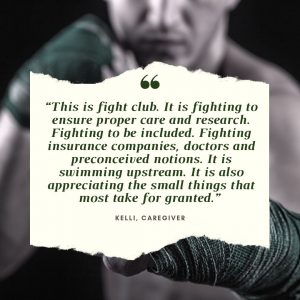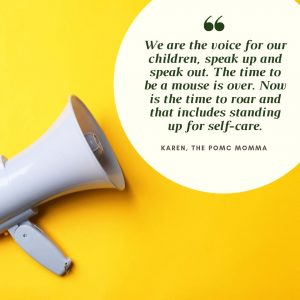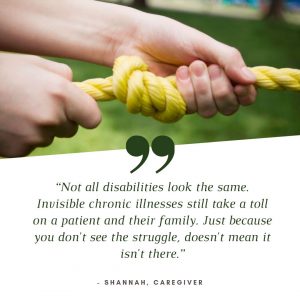Caring for someone with any chronic health condition is an experience that is hard to relate to unless you’re going through it. Resources and support for caregivers are often hard to come by, friends and family don’t often understand, and treatment can be difficult to find, expensive and time-consuming. Now imagine those same issues magnified through the lens of seeking answers and support for a rare health condition.
Many people live with this experience on a daily basis, and unfortunately, they often feel all alone in their struggle. Friends and family can’t truly understand what it’s like and doctors don’t always know how to provide support. The result is that too many become increasingly isolated and cut off from the care and connection that they need while they “chase” symptoms and treatments that may or may not work.
We wanted to shed some like on this topic, so we asked care providers of people living with rare health conditions what they had to say. 3 strong messages emerged.



Advocating for yourself and the person you love is key
“This is fight club. It is fighting to ensure proper care and research. Fighting to be included. Fighting insurance companies, doctors and preconceived notions. It is swimming upstream. It is also appreciating the small things that most take for granted.” – Kelli
“We are the voice for our children, speak up and speak out. The time to be a mouse is over. Now is the time to roar and that includes standing up for self-care.” – Karen, The POMC Momma
“Share ideas, don’t feel alone. Wherever you are, however far you are geographically from a fellow sufferer, there will always be someone somewhere you can reach out to. Use all the resources of the Internet.” – Anonymous



Caregiving can be a fulltime job
“Caring for my medically complex child is a 24 hour, 7 days a week task. Managing his appointments and dealing with insurances and paperwork take hours of my time. While he looks like a normal child, his condition affects [his ability] to live as a normal 2nd grader. His health conditions require many medications, appointments, tests, and hospitalizations. He is unable to attend school at this time.” – Karen
“Caring for someone with a rare disease (let alone two) presents its own set of unique challenges. I always have to be on my game to care for my husband (the love of my life) since I am his sole caregiver. Learning to navigate through medical issues, doctors, specialists, and treatment has been difficult for us. One of my friends suggested that I look into assisted living choices like those offered by Chelsea Senior Living, a site to find respite care Tinton Falls, NJ, or other nearby places. I’m not sure if I want to do that yet, but it’s something to consider when everything gets too much.
You should see my date timer that’s scribbled with medical appointments! Doing your own research is an absolute must! We have often had to educate some of hubby’s physicians about his rare diseases. It took a number of years before my hubby was properly diagnosed and the frustration level is still immense!
There are days when I am completely drained and emotionally spent trying to deal with all that’s involved in being a caregiver. I have a very difficult time asking for help and my circle of family and friends have their own lives, health issues, work schedules, etc. and aren’t readily available. If someone suggests something specific, I think I could accept their help because I know they do care about our situation. Sometimes I find myself getting lost in all that’s going on and I know I need to arrange for ‘me’ time.”– Juliet



Caregivers need a support system too
“Not all disabilities look the same. Invisible chronic illnesses still take a toll on a patient and their family. Just because you don’t see the struggle, doesn’t mean it isn’t there.” – Shannah
“It takes all of your time. You lose yourself. I love my son with every part of my being and will happily care for him as long as I can but, I have no idea who I am anymore!” – Carol
Join Us


It is extremely difficult to find doctors familiar with Klippel-Feil syndrome
i find every time i change doctors or go to a specialist i have to train them on my disorder it’s very frustrating but,it seems to be par for the if you have a rare disorder like mine( septo-optic dysplasia)
Im not family but i am a caregiver to a women with Parkinson’s. Who is 83 just disgnosed but has had it for years. Everybody sweeps it under the rug. Nobody even says the word Parkinson’s. Just me. I’ve been doing everything exercises intouch with Parkinson’s. Nobody respects my opinions and i know alot about alot of these diseases. From training and knowledge but i have no credentials so they don’t listen its long and complicated and very very frustrating. Im not and refuse to lay down and watch this women die from this disease.she will die when the good lord takes her. So we are going to slow her progression down and keep her just the way she is !!! That’s a promise. She trusts me and she trusts me. We exercise, she has a journal, she reads about with me. She needs to know. Im going to get her in outpatient pt and im shooting for massage too. Today I’m calling the dr. I know i work for an agency and they are just ss blind to it. I might lose my job. But at the end of the day i msde a difference in hers. When noone else will. My hand hurts. I would love comments suggestions or maybe you want to say im crazy. Whatever. This is a long story and more to it . But i have to go to work now. Thanks for listening!❤